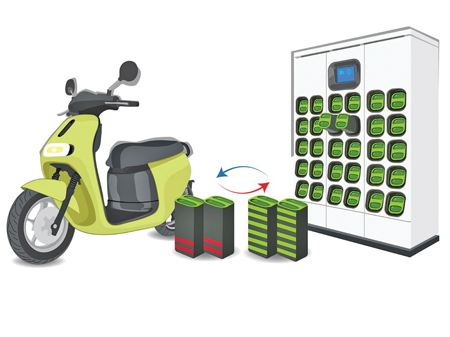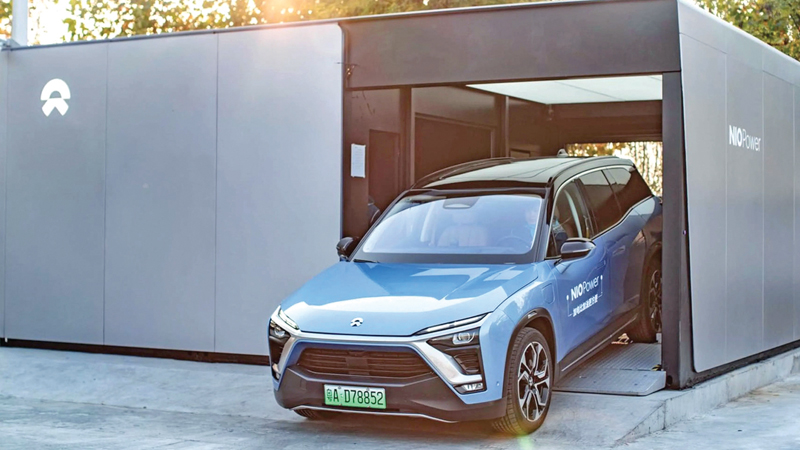Battery swapping – which simply means changing out depleted electric vehicle (EV) batteries for fresh, recharged ones – is an alternative to charging batteries inside the vehicle, as is used for the vast majority of the world’s electric cars.
While battery swap is still largely a nascent sector, China has the world’s most developed model by far. While it is mainly used for larger vehicles – close to half of the electric heavy-duty trucks sold in China in 2023 were equipped with battery-swap technology – the country is also seriously experimenting with swaps for personal cars.
Chinese electric vehicle company Nio has now built over 3,300 battery swap stations in China, while CATL, the world’s largest EV battery producer, recently announced plans with oil giant Sinopec to build a “battery-swapping ecosystem across the whole nation”.
Battery swapping can have some big advantages, in particular the lower amount of time it takes compared to recharging a battery while it is inside a car. Still, it faces obstacles in China, which is also developing fast charging infrastructure at breakneck speed.
In fact, experts say that it may be in the countries which, unlike China, remain in the early stage of a switch to EVs that battery swaps prove most useful for supporting electric car uptake – especially when it comes to addressing range anxiety among drivers.
Tesla’s plans to launch its own 90 second battery swap service were widely reported, with initial swapping locations along routes between Los Angeles and San Francisco, and Boston and Washington. But just two years later, it began phasing swapping out again, citing low market acceptance.
Plug-in battery cars have dominated EV growth in China, but by 2021 it had also built at least 900 battery swap stations. That same year, it officially launched a pilot battery swap scheme in 11 cities. These projects are now scaling quickly: in 2023, China added around 1,600 new battery swap stations, bringing the total to some 3,570 stations.
However, not all EVs are capable of battery swapping – the stations must be compatible with the car’s battery system, so only certain models that are designed for it can make the switch.
At present, battery swaps are most widely used by commercial vehicles such as taxis and logistics vehicles, not passenger cars. Several Chinese experts told the BBC that’s because, in several ways, the battery swap model has proven to be less advantageous than simply charging.
Fast charging
In China, charging technology is constantly developing. Mainstream electric vehicles in China will support high-voltage fast charging of 800V and above by this year, according to one report. Major Chinese automakers such as BYD, Xpeng and Nio have now developed vehicles equipped with super-charging technology, which takes 15 minutes or so to charge batteries from 10 percent to about 80 percent. In March 2025, BYD announced a new charging system which it says can deliver 400 Km of range in five minutes of charging, making them twice as fast as Tesla’s superchargers. BYD plans to roll out a network of 4,000 of these “flash-charging” stations across China.
 By the end of 2026, over 13 million vehicles in China are expected to be equipped with high-voltage fast charging. The country accounted for almost two-thirds of the 17 million EVs sold globally in 2024, a surge driven by China’s push to reduce dependence on imported oil and establish global leadership in green technologies.
By the end of 2026, over 13 million vehicles in China are expected to be equipped with high-voltage fast charging. The country accounted for almost two-thirds of the 17 million EVs sold globally in 2024, a surge driven by China’s push to reduce dependence on imported oil and establish global leadership in green technologies.
The ownership question is another thing holding back battery swaps for private vehicles, both in China and elsewhere. Battery swaps inherently require car owners to relinquish ownership of a particular battery. If a car owner has just bought a new car and swaps its battery on the motorway, for example, they will very likely receive an older battery. Many car companies are aware of this issue, and some have adopted a business model of separating the car and the battery: consumers buy their cars without batteries, which they rent directly from the company.
But this business model requires automakers to own and manage a large number of batteries, tying up significant capital and increasing financial risk.
Popularising battery swap stations will also require automakers to accept a unified battery pack standard, so batteries can be interchanged more freely, says Jing Yang, director at the Asia-Pacific corporate ratings division of Fitch Ratings, a credit rating agency based in New York. Carmakers, however, are reluctant to do this, she says: mastering their own battery technologies is an important way for them to maintain industry influence.
Widely promoted
For commercial vehicles, such as heavy-duty trucks, taxis and buses, problems are easier to solve. These vehicles often operate in more predictable patterns, with centralised management, fixed routes or designated service areas, making it easier to plan and coordinate battery swaps efficiently. Battery swapping heavy-duty trucks are currently being widely promoted in China through both government policies and private companies, says Lulu Xue, mobility lead at the China office of the World Resources Institute, a global non-profit.
The Chinese Government has extended considerable financial assistance to battery swapping schemes. In its 2021 pilot program, three of the 11 cities are primarily focusing on battery swapping for trucks. Some provinces in China have also provided substantial financial incentives for the advancement of battery swapping technology.
China has been able to widely promote battery swap stations so quickly since it is home to the main lithium-ion battery manufacturers, and thus has a relatively inexpensive and abundant supply of batteries, according to Yihao Xie, a researcher on heavy-duty vehicles at the Washington-based International Council on Clean Transportation.
Battery swap stations are a similar size to petrol stations, which can be easily repurposed to be battery swaps. The China National Petroleum Corporation, for example, has already built both charging and battery replacement facilities at some of its gas stations.
Some companies are also trying more specialised methods. Like many facilities in China, using land for battery swap stations requires approval and filing, making the entire cycle relatively long, and the land rent also increases the cost of the stations. To avoid these, some companies have developed mobile battery swap vehicles, says Xue, which have the added benefit of being able to charge batteries in locations with lower electricity prices, then swapping them in areas where on-site charging would be more costly.
For commercial vehicles, battery ownership concerns are easier to manage, since companies can purchase batteries in bulk or rely on third-party providers. But the issue is still affecting how often at least some drivers of these vehicles use swap stations.
Currently, there is a clear business model in China for battery swaps for heavy-duty trucks, especially for intensive but short-distance uses such as in factories and mines.
“Battery-swapping in commercial vehicles, especially heavy-trucks, is still faster than the fastest charger technologies currently in the market. Trucks carry batteries with much larger capacities and those are just slower to charge until much more powerful chargers become available. These advantages are unlikely to weaken even as fast charging technology develops,” he adds.
Energy storage
There is another potential reason to develop battery swap stations: to use them as energy storage stations. Due to the variable nature of renewables like solar and wind, which are booming in China, a huge amount of energy storage is needed to ensure the stability of the power grid. EV batteries, including those in battery swap stations, are one way of providing this. Battery swap companies could use their batteries to earn the difference in electricity prices between peaks and troughs, he says.
Some battery swap operators are already eyeing up this opportunity, but so far no stations in China or elsewhere are used in this way. It could provide another big benefit though: supporting the grid when local distribution grids are knocked out by extreme weather. One hundred battery swap stations would be equivalent to a 50MW energy storage power station, notes one industry report.
It is possible that battery swaps may only ever be a relatively niche offering in China, where both EVs and their charging infrastructure are now widespread. But other countries have struggled to adopt EVs, and battery swaps may in fact play their most useful role in countries where EVs are not yet popular.
Battery swaps are already being explored outside China. India and several other South East Asian countries are developing battery swap technology for scooters and motorbikes, and in 2022 India announced a new battery swap policy to promote the sales of electric cars.
In 2023, Taiwan-based battery swap company Gogoro announced a $2.5bn (£1.9bn) partnership with the Indian state of Maharashtra and local supplier Belrise to build smart battery-swapping and energy infrastructure. Kenya similarly announced a partnership with electric vehicle and battery swap company Spiro in 2023. After trials with Uber in San Francisco in 2021, California battery-swapping start-up Ample now has partnerships to integrate its swap station technology with Netherlands-based carmaker Stellantis and Tokyo’s EV infrastructure.
Both battery swapping and fast charging promote demand for pure electric vehicles. It remains to be seen what the final balance of these two technologies will prove to work best.
As per the Nio slogan, battery swaps can be seen as a sort of “gas station” for EVs. Whether they can ever reach the scale of gas stations, or even of EV recharging stations remains to be seen. (BBC)







